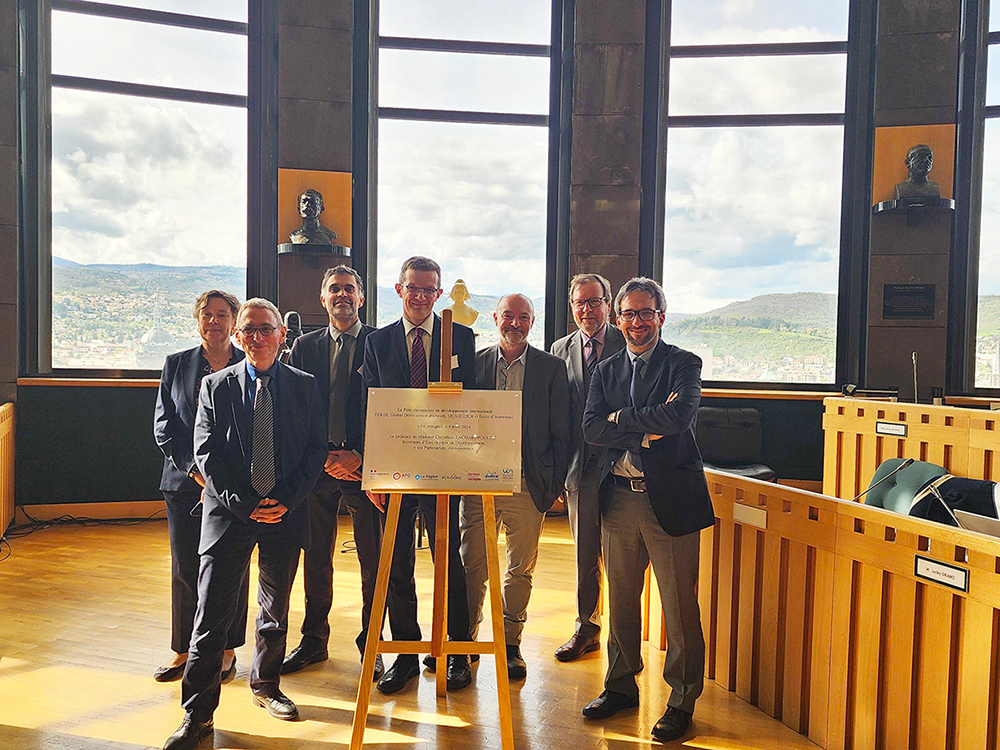
The Pôle clermontois de développement international (PCDI) or Clermont International Development Hub was successfully launched on April 4, 2024 in Clermont-Ferrand, France by Chrysoula Zacharopoulou, Secretary of State to the Minister for Development and International Partnerships, and Patrick Guillaumont, President of FERDI; Jean-Louis Arcand, President of the GDN; and Mathias Bernard, President of Clermont Auvergne University. The PCDI is a platform to support social science research, training and capacity building in the Global South, and global collaboration for sustainable development. It is a space for reflection and exchange of expertise from both the North and the South, that aims to play a role in the formulation of global policies and solutions to current challenges.
The PCDI is the result of a collaboration between three institutions dedicated to international development:
- Centre d'études et de recherches sur le développement international (CERDI)
- Fondation pour les études et les recherches sur le développement international (FERDI)
- Global Development Network (GDN)
During her speech, Chrysoula Zacharopoulou said, “What brings us together, what unites us is friendship, love and ambition. Today, the Clermont hub represents this because it is built from the conviction, determination, and madness of the founders. I thank Jean-Louis Arcand and GDN because since 2022, you have brought an international seal to this project and to this city, an incredible element to transfer research to the south and to also help the development of the south – in a world that seems so fragmented due to multiple crises and its coordinates.
It’s wonderful to see CF on the map; I think it’s chic to see it on your business card! I appreciate the international strength of GDN. Together, these three high level players will meet the challenges of the 21st century, because we need to invent development and they are the innovators who can make this happen!”
She went on to say, “Development policy is not a charitable policy, it is a true investment that will benefit our citizens, enterprises, researchers, and territories. The Pôle clermontois de développement international is the best example to show us how this investment can help create employment and attract researchers of an international stature and pull in international organizations like GDN. This hub personifies coordination and partnership ethics, with three institutions bringing together their strengths for a common objective. It gives this city a momentum, that it needs so badly. This is a win-win partnership.”
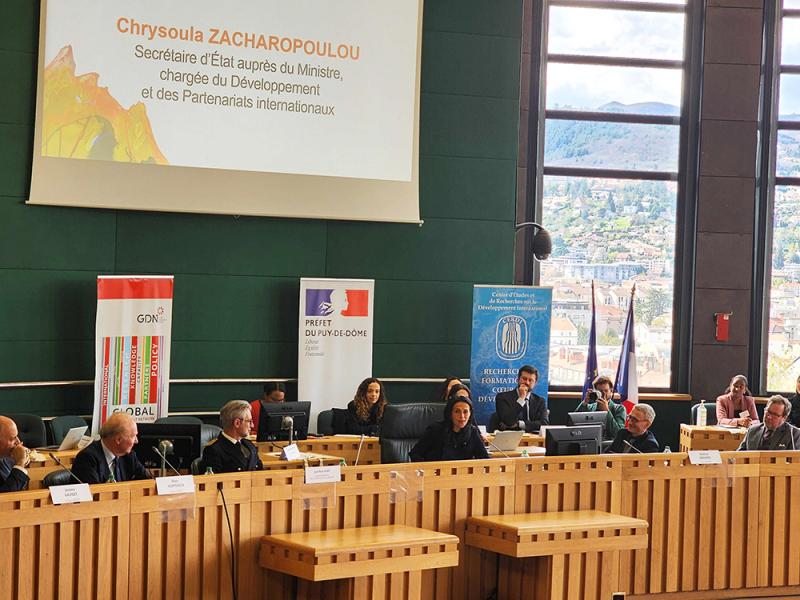
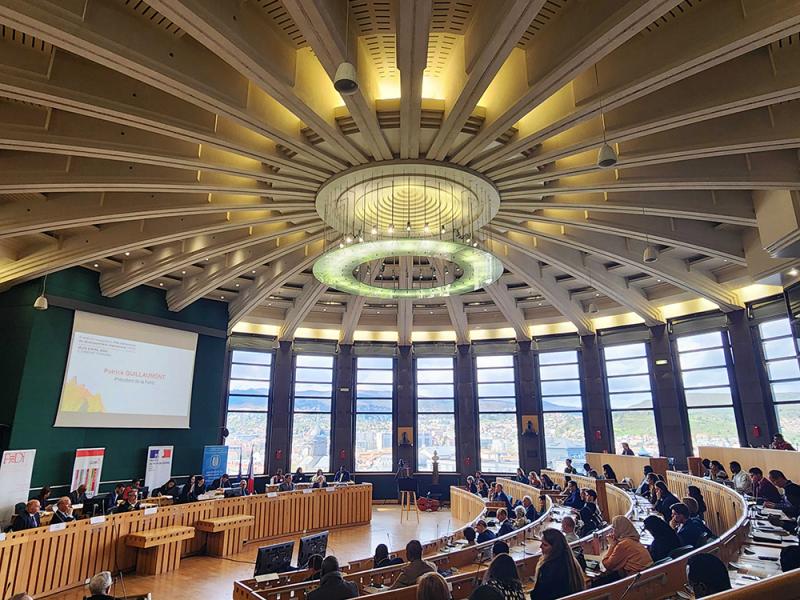
Patrick Guillaumont added, “The PCDI has born out of need more than chance. We needed in France a hub for research in development, rooted in the region, which would be highly visible internationally. A hub with a European identity and an international identity, especially associated with the Global South. The PCDI brought GDN to our team, and we have needed GDN to be part of this hub. In fact, GDN was a catalyst. They brought us international status, independence, a much wider network with what we previously had from FERDI and CERDI – and it’s more diverse in terms of subject. GDN is not just about economic research but ALL the social sciences!”
“CERDI is a center of expertise where we recognize that research is important when it can be transferred. Today, we can say that all the activities that are part of CERDI and GDN are a crucial element for the economic attractiveness of our university. The arrival of GDN, this will allow us to go even further to improve and reinforce the visibility for the action we take in these areas and become more international. This will help us build public-private partnerships, for example, Michelin, and academic partnerships too,” said Mathias Bernard.
In his speech, Jean-Louis Arcand stated, “GDN’s objective is to amplify the voice of researchers from the south. We have projects supported by various French institutions and we are grateful for that. On PCDI, when you take research centers like CERDI and FERDI and an international organization like GDN, put them in a test tube and shake them up, some amazing things can happen! PCDI should become as essential and recognizable as a local market. We want our local roots to go very deep and become very strong.”
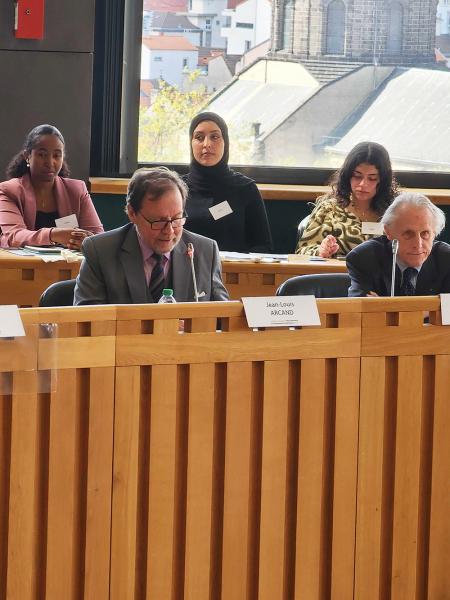
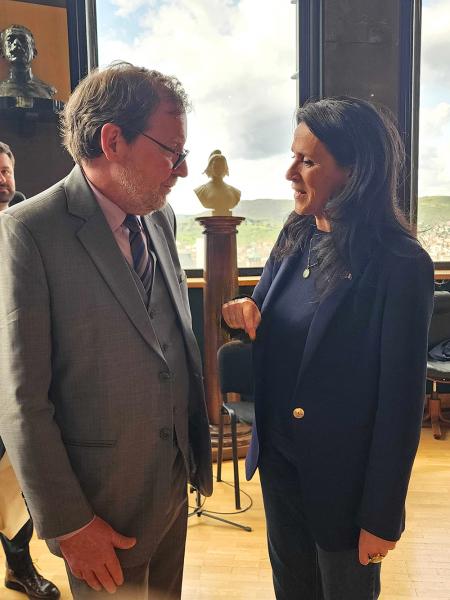
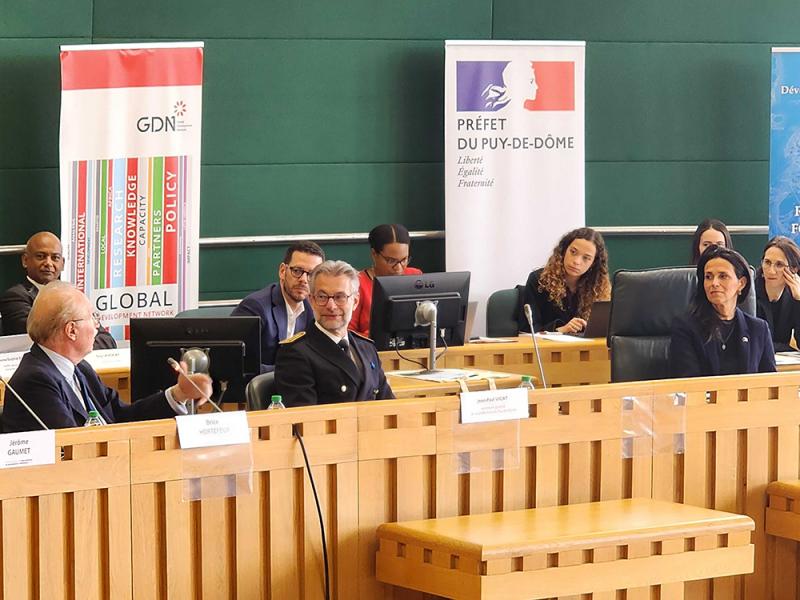
Other panelists to speak at the launch event included M. William Roos, Head of the Multilateral Affairs and Development Department at the Treasury Directorate General; M. Rémy Rioux, Chief Executive Officer of Agence Française de Développement; M. Florent Menegaux, President of Michelin Foundation, and more. The event was also attended by young researchers from FERDI and GPE who spoke on the occasion.
The launch event will concluded with a roundtable discussion on the topic 'How can international funding support financial and fiscal innovation at the local level?' aimed at the 4th United Nations Conference on Financing for Development.
EVENT DETAILS
DATE: Thursday, April 4, 2024
VENUE: Conseil départemental du Puy-de-Dôme (Salle d’Assemblée), Hôtel du Département, 24 rue Saint-Esprit, 63033 Clermont-Ferrand
TIME: 14:30 CET
Le Pôle clermontois de développement international (PCDI) sera officiellement lancé le 4 avril 2024 à Clermont-Ferrand, en France, par Chrysoula Zacharopoulou, secrétaire d'État auprès du ministre du Développement et des Partenariats internationaux, et Patrick Guillaumont, président de FERDI, Jean-Louis Arcand, président du GDN, et Mathias Bernard, président de l'Université Clermont Auvergne. Le PCDI est une plateforme destinée à soutenir la recherche en sciences sociales, la formation et le renforcement des capacités dans les pays du Sud, ainsi que la collaboration mondiale pour le développement durable. C'est un espace de réflexion et d'échange d'expertise du Nord et du Sud, qui vise à jouer un rôle dans la formulation de politiques mondiales et de solutions aux défis actuels.
Le PCDI est le résultat d'une collaboration entre trois institutions dédiées au développement international:
- Centre d'études et de recherches sur le développement international (CERDI)
- Fondation pour les études et les recherches sur le développement international (FERDI)
- Global Development Network (GDN)
Lors de son discours, Chrysoula Zacharopoulou a déclaré: "Ce qui nous rassemble, ce qui nous unit, c'est l'amitié, l'amour et l'ambition. Aujourd'hui, le pôle clermontois représente cela car il est construit à partir de la conviction, de la détermination et de la folie des fondateurs. Je remercie Jean-Louis Arcand et GDN car depuis 2022, vous avez apporté un cachet international à ce projet et à cette ville, un élément incroyable pour transférer la recherche vers le sud et aussi pour aider au développement du sud - dans un monde qui semble si fragmenté à cause des multiples crises et de ses coordonnées.
C'est merveilleux de voir la FC sur la carte; je pense qu'il est chic de la voir sur votre carte de visite ! J'apprécie la force internationale du GDN. Ensemble, ces trois acteurs de haut niveau relèveront les défis du 21e siècle, car il faut inventer le développement et ils sont les innovateurs qui peuvent le faire!”
Elle a ajouté: “La politique de développement n'est pas une politique caritative, c'est un véritable investissement au service de nos concitoyens, de nos entreprises, de nos chercheurs et de nos territoires. Le Pôle clermontois de développement international est le meilleur exemple pour nous montrer comment cet investissement peut permettre de créer de l'emploi et d'attirer des chercheurs d'envergure internationale et de tirer des organisations internationales comme le GDN. Ce pôle incarne l'éthique de la coordination et du partenariat, avec trois institutions qui unissent leurs forces pour un objectif commun. Il donne à cette ville l'élan dont elle a tant besoin. Il s'agit d'un partenariat gagnant-gagnant.”
Patrick Guillaumont a ajouté: "Le PCDI est né d'un besoin plus que d'un hasard. Nous avions besoin en France d'un pôle de recherche pour le développement, ancré dans le territoire, qui soit très visible à l'international. Un pôle avec une identité européenne et une identité internationale, notamment associée aux pays du Sud. Le PCDI a apporté GDN à notre équipe, et nous avons eu besoin de GDN pour faire partie de ce pôle. En fait, GDN a été un catalyseur. Il nous a apporté un statut international, l'indépendance, un réseau beaucoup plus large que celui que nous avions auparavant avec la FERDI et le CERDI - et il est plus diversifié en termes de sujets. Le GDN ne concerne pas seulement la recherche économique, mais TOUTES les sciences sociales!”
"Le CERDI est un centre d'expertise où nous reconnaissons que la recherche est importante lorsqu'elle peut être transférée. Aujourd'hui, nous pouvons dire que toutes les activités qui font partie du CERDI et du GDN sont un élément crucial pour l'attractivité économique de notre université. L'arrivée du GDN va nous permettre d'aller encore plus loin pour améliorer et renforcer la visibilité des actions que nous menons dans ces domaines et de nous internationaliser. Cela nous aidera à construire des partenariats public-privé, par exemple avec Michelin, mais aussi des partenariats académiques", a déclaré Mathias Bernard.
Dans son discours, Jean-Louis Arcand a déclaré: "L'objectif du GDN est d'amplifier la voix des chercheurs du Sud. Nous avons des projets soutenus par diverses institutions françaises et nous en sommes reconnaissants. En ce qui concerne le PCDI, lorsque vous prenez des centres de recherche comme le CERDI et le FERDI et une organisation internationale comme le GDN, que vous les mettez dans une éprouvette et que vous les secouez, des choses étonnantes peuvent se produire ! La PCDI doit devenir aussi essentielle et reconnaissable qu'un marché local. Nous voulons que nos racines locales soient très profondes et très fortes.”
Parmi les autres intervenants, citons M. William Roos, Chef du service des Affaires multilatérales et du développement à la Direction générale du Trésor; M. Rémy Rioux, Directeur général de l’Agence française de développement; M. Florent Menegaux, Président de Michelin, et bien d'autres encore. De jeunes chercheurs de FERDI et de GPE ont également participé à l'événement et ont pris la parole à cette occasion.





